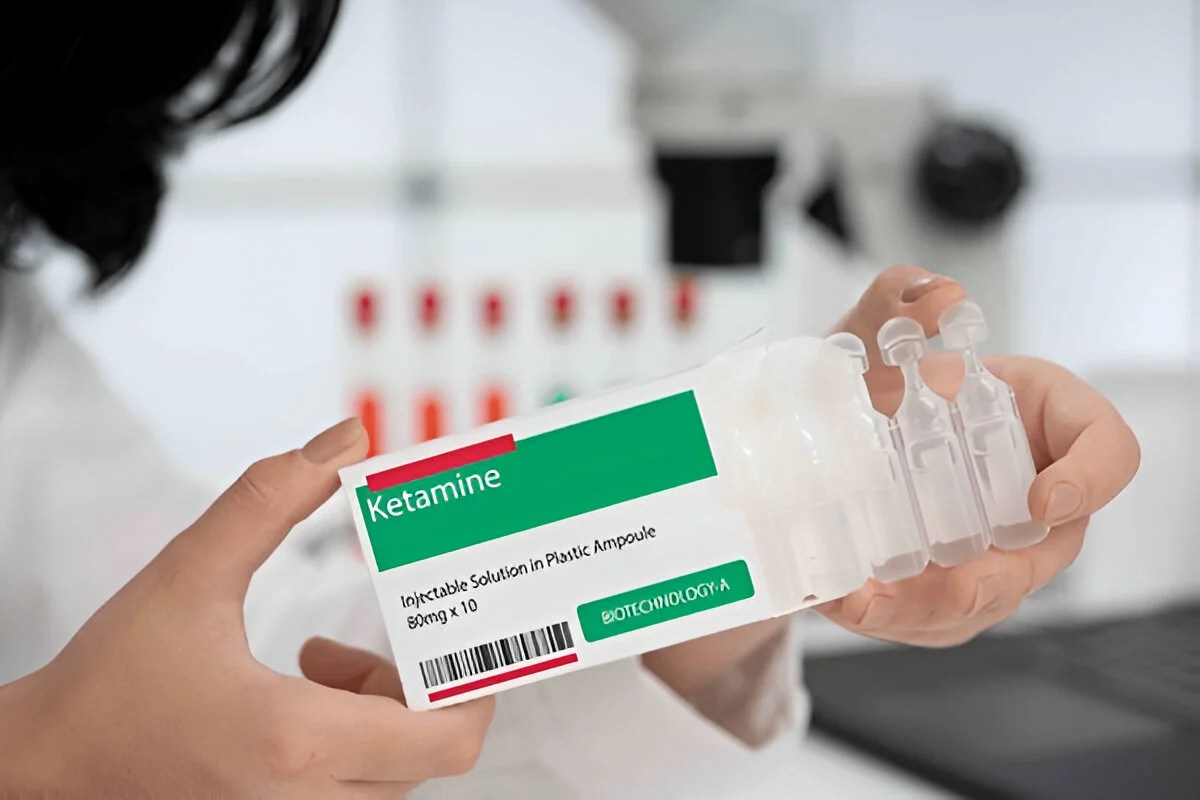Dealing with mental health struggles like depression, anxiety, or PTSD can often leave you feeling stuck. You can try different methods, but sometimes the weight of it all doesn’t lift. It’s tough, and it’s frustrating. If that sounds familiar, you’re not alone, and there may be a way forward with ketamine-assisted psychotherapy (KAP). But what is ketamine assisted psychotherapy? In short, it is a unique treatment that’s been helping people break free from those patterns and make real progress. By combining ketamine’s effects with talk therapy, this treatment offers a fresh approach to healing that can provide relief faster than traditional forms of therapy.
Here’s what you can expect from this blog:
- What exactly ketamine-assisted psychotherapy is and how it works
- The benefits it offers, especially for those struggling with long-term symptoms of depression and other mental health challenges
- How to know if KAP might be a good fit for you and what to expect during a session
Read through to the end, as it will give you a clearer idea of what KAP can offer—and how it might be the right step toward healing.
What Is Ketamine Assisted Psychotherapy (KAP)?
Ketamine-assisted psychotherapy (KAP) is a treatment that blends the healing effects of ketamine with the therapeutic power of talk therapy. Ketamine is a medication that, at lower doses, has been shown to help people work through deep emotional and psychological challenges in a way traditional therapy sometimes can’t.
In KAP, ketamine is administered in a safe, controlled environment, and while the medication works in your system, your therapist is there to guide you through the process. It helps you access difficult emotions and gives you a fresh perspective on healing from severe depression and other mental and emotional challenges. Unlike other forms of therapy, ketamine works quickly and can often lead to lasting changes after just a few sessions.
With its ability to address conditions like depression and anxiety, KAP is showing real promise as a viable treatment option for individuals struggling with mental health and addiction issues.
How Does Ketamine-Assisted Psychotherapy Work?
When you consider this treatment option, it’s important to understand the journey you’ll go on. The ketamine therapy process is designed to be supportive, gentle, and tailored to your needs. It’s not just about taking a medication—it’s about opening up space for healing. Here’s a closer look at how ketamine treatment works, step by step:
1. Preparation Phase
Before you start any ketamine sessions, you’ll have an initial meeting with your therapist. This is a time to prepare for the ketamine treatment by getting to know each other, setting goals, and talking about what you hope to gain from the medical treatment process. This preparation for ketamine-assisted psychotherapy is all about building trust and ensuring you’re comfortable moving forward.
2. The Ketamine Session
Once you’re ready, you’ll receive a carefully administered ketamine dose, typically in the form of a lozenge. You’ll relax in a safe, calm environment where you can let go of everyday stressors. The ketamine will take effect, allowing your mind to access emotions and memories that might be harder to reach during regular therapy. Throughout the session, your therapist will guide you, offering support and helping you navigate what’s coming up.
3. Integration Phase
After the session, the real work begins. The insights and feelings that surfaced during the ketamine experience need time to settle. Your therapist will help you make sense of everything in follow-up sessions, assisting you in integrating these new insights into your daily life. This phase is where the lasting changes start to take shape.
What Are the Benefits of Ketamine-Assisted Psychotherapy?
For many people, psychological challenges can feel like an endless cycle—whether it’s the weight of depression, the anxiety that won’t lift, or past trauma that won’t let go. KAP offers a unique chance to break free from this cycle and experience relief in a way that’s faster and more profound than what traditional therapy alone might offer. Here are a few key benefits of KAP:
1. Fast Relief
One of the standout features of ketamine therapy is its ability to provide quick relief. There are some treatments of mental health disorders that take weeks or even months to show noticeable results. However, according to KAP research, the process can offer improvements within one day, sometimes in a matter of hours. For patients with depression and anxiety, this can feel like a life-changing treatment.
2. Deeper Emotional Healing
Ketamine allows people to access deeper layers of emotion and memory that might be too difficult or painful to reach during regular therapy. This can lead to breakthroughs, allowing for more significant healing and a better understanding of one’s emotions, behavior, and life patterns.
3. Better Outcomes for Treatment-Resistant Conditions
For individuals who have tried many forms of therapy and medication for anxiety and depression without success, KAP has been shown to be an effective alternative. Conditions like treatment-resistant depression and PTSD, which don’t always respond to traditional treatments, may see improvements with ketamine therapy.
4. Rewiring the Brain for Healing
Ketamine helps promote neuroplasticity, which is the brain’s ability to form new connections. This is important for individuals dealing with psychological conditions, as it can allow the brain to break free from old patterns and create healthier ones. This process gives people a chance to shift their mindset and responses to emotional triggers.
For many, these benefits are not just about feeling better—they’re about experiencing a real shift in how they approach life, relationships, and their mental well-being.
Essential Safety Measures and Considerations
While KAP offers many benefits, it’s important to approach any new treatment with a full understanding of its potential risks and precautions. Fortunately, the administration of ketamine is done in a carefully controlled setting, which ensures your safety throughout the process. Here’s what you should know about the safety and considerations when exploring it as a treatment option:
1. Medical Supervision is Key
Ketamine should always be administered under the guidance of a trained professional. In KAP, the ketamine dose is carefully measured and monitored to ensure it’s appropriate for each individual. This professional oversight helps prevent any adverse effects and ensures that the session remains safe and productive.
2. Possible Side Effects of Ketamine
As with any treatment, ketamine may have side effects. While most people experience minimal issues, some may feel mild symptoms like dizziness, nausea, or a feeling of dissociation during or shortly after the session. These effects are usually short-lived and tend to resolve quickly. If you experience anything more serious, your healthcare provider will be available to assist you immediately.
3. Not for Everyone
Although KAP can be highly effective for many people, it’s not the right fit for everyone. People with certain health conditions, like uncontrolled high blood pressure or heart issues, may not be suitable candidates for ketamine therapy. Before starting treatment, you’ll have a thorough assessment to make sure it’s safe for you.
4. Psychological Safety and Support
While ketamine can open up emotional doors, it’s essential to have psychological support throughout the process. That’s why KAP pairs ketamine with therapy—having a trained therapist by your side ensures you have the right guidance to navigate any intense feelings or insights that may arise. Your therapist will be there to help you process your experiences and integrate them into your healing journey.
5. Ethical Considerations
It’s important to feel comfortable and trust your KAP provider. Ethical practice is key to ensuring you feel supported, respected, and cared for during every step of the treatment. At The Compassion Practice, your well-being is a priority, and every measure is taken to ensure you’re fully informed and comfortable with your treatment plan.
What to Expect During a Ketamine-Assisted Psychotherapy Session
If you’re considering KAP, it’s natural to wonder what the actual experience will be like. The process may feel a little different from traditional therapy, but it’s designed to help you feel comfortable, safe, and supported as you navigate the healing journey. Here’s a step-by-step look at what you can expect during a typical session:
1. Setting the Stage
Before anything begins, your therapist will take time to check in with you and ensure that you’re ready for the session. You’ll talk about your goals for the day and any emotions or thoughts that might come up. It’s a chance to set your intention for the session—whether that’s to explore a specific issue or to allow whatever comes up to unfold naturally.
2. The Ketamine Administration
During the session, you’ll receive a carefully measured dose of ketamine. The medication is generally given orally in the form of a lozenge. As the ketamine begins to take effect, you may start to feel a sense of calm or mild dissociation, which helps you step outside of your usual mental patterns. This allows for deeper emotional processing.
3. The Therapeutic Experience
As you’re under the influence of ketamine, your therapist will guide you through the experience. The goal is to help you stay grounded while also allowing your mind to open to new perspectives. You may feel more open to exploring past emotions, memories, or ideas that have been difficult to access in a regular therapy setting. Ketamine can cause an emotional release or a moment of clarity—often leading to breakthroughs in how you view yourself and your challenges.
4. After the Session
Once the ketamine starts to wear off, you’ll feel more grounded and calm. Your therapist will guide you through a process of integration, where you can talk about the feelings, insights, or revelations that came up during the session. This follow-up time is essential, as it helps you make sense of what you experienced and begin applying it to your life moving forward.
5. Post-Session Support
After your session, it’s important to take care of yourself. Your therapist will offer support and suggestions for self-care, and you might be encouraged to take it easy for the rest of the day. The effects of the drug wear off relatively quickly, but the emotional and psychological shifts you experience can continue to unfold over the following days.
Overall, a KAP session is meant to be a safe, supportive, and insightful experience that helps you get to the heart of what’s holding you back, with the added benefit of ketamine to facilitate deeper emotional healing.
Is Ketamine-Assisted Psychotherapy Right for You?
Deciding whether KAP is the right treatment for you is an important and personal choice. But how can you know if it’s the right fit? Here are a few things to consider as you think about whether KAP could be the solution for you:
1. Have You Struggled with Traditional Therapies?
If you’ve been feeling stuck or haven’t found success with other forms of treatment for mental health issues, KAP might be an option worth exploring. For people who have treatment-resistant depression, anxiety, or PTSD, ketamine-assisted psychotherapy may offer a fresh, fast-acting alternative when other methods haven’t been effective.
2. Are You Open to a New Approach?
KAP combines psychotherapy with ketamine therapy, which might feel a bit different from what you’re used to in a traditional talk therapy session. If you’re open to trying something new and are willing to explore emotions and memories in a deeper, more direct way, KAP could be a great fit for you.
3. Are You Ready for Change?
Healing often requires a willingness to dive deep and face difficult emotions. KAP can help you access new perspectives and emotional insights, but it requires a commitment to that process. If you’re ready to work through tough feelings and embrace the opportunity for emotional growth, you may find KAP to be transformative.
4. Do You Have the Right Support System?
While KAP is a powerful tool, it’s essential to have the right emotional and psychological support in place. Your therapist will be there to guide you through the process, but it’s also important to have a strong support system outside of therapy, whether that’s friends, family, or community.
5. Have You Had a Thorough Assessment?
Before starting KAP, a mental health professional will conduct a thorough assessment to ensure that the use of ketamine is a safe and suitable option for you. Various mental health conditions or medications may not be compatible with ketamine, so this step is crucial to ensure you’re making an informed decision.
Frequently Asked Questions (FAQ)
Q. What’s the difference between ketamine-assisted therapy and traditional talk therapy?
In traditional talk therapy, the therapist helps you explore your thoughts and feelings through conversation. KAP adds a different element by using low doses of ketamine to help you access deeper emotions and memories that might be difficult to reach in normal therapy.
Q. How long do the effects of a ketamine treatment session last?
The effects of ketamine wear off relatively quickly, often within a couple of hours. However, the emotional and mental shifts can continue beyond the session, often staying for days or even weeks.
Q. Is ketamine-assisted psychotherapy covered by insurance?
KAP treatment is typically considered an out-of-network process and may not be covered by standard insurance plans. However, many clients are able to get partial reimbursement through their insurance’s out-of-network benefits. It’s always a good idea to check with your provider to understand how to make the most of your insurance benefits.
Q. Can ketamine-assisted psychotherapy be combined with other therapies?
Yes! Ketamine therapy works well in conjunction with other treatments, including traditional talk therapy or therapies like Cognitive Behavioral Therapy (CBT) or Dialectical Behavior Therapy (DBT). In fact, many therapists use ketamine in conjunction with traditional therapy for a more effective treatment.
Q. Are there long-term effects from ketamine-assisted psychotherapy?
While ketamine can have short-term effects during a session, research suggests that it can also lead to long-term improvements in mood, emotional regulation, and mental health. Studies show that people who receive ketamine therapy experience lasting benefits, particularly in conditions like depression and PTSD. However, it’s important to continue with therapy and support after KAP to ensure these benefits are maintained.
Final Words
Deciding to explore ketamine-assisted psychotherapy (KAP) is a brave step toward healing. Whether you’re struggling with mental health symptoms like depression, anxiety, or PTSD, KAP is a promising treatment that offers a fresh approach, combining the therapeutic benefits of ketamine use with the guidance of a trained therapist. It’s a unique way to break through emotional barriers and create lasting change.
If traditional therapies haven’t worked for you, KAP could offer the relief and progress you’ve been seeking. At The Compassion Practice, we’re here to guide you through every step of the process, ensuring you feel supported and empowered.
Ready to learn more or take the next step? Reach out today to see how KAP can help you unlock a new path to healing. We’re here to support you on your journey.











